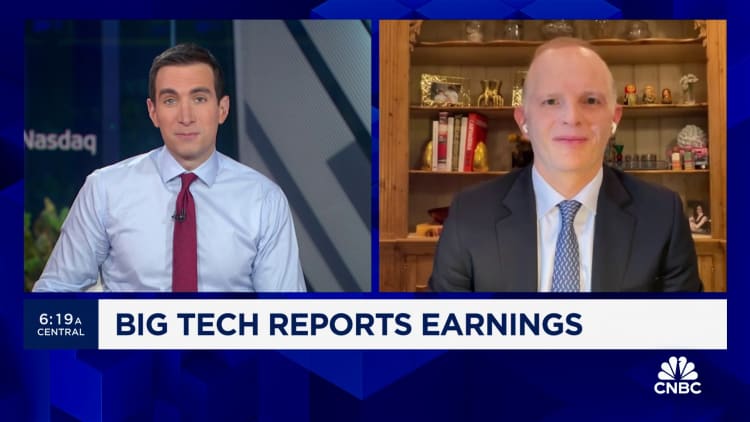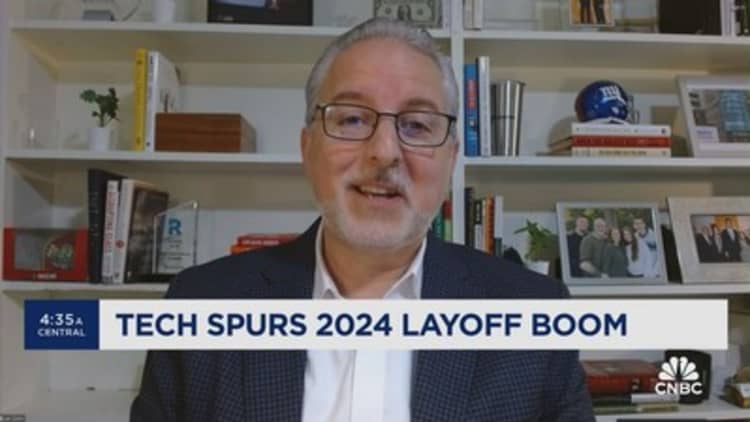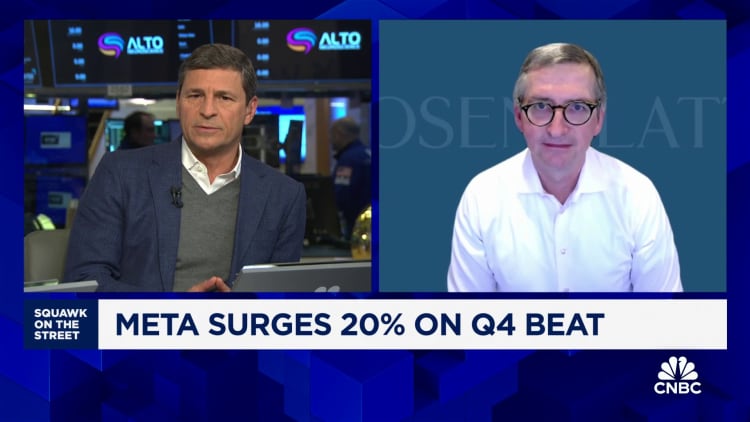Visitors
take
photos
in
front
of
the
Meta
sign
at
its
headquarters
in
Menlo
Park,
California,
December
29,
2022.
Tayfun
Coskun
|
Anadolu
Agency
|
Getty
Images
Technology
companies
are
learning
an
old
lesson
from
Wall
Street:
maturing
means
shrinking.
Meta
and
Amazon
saw
their
shares
spike
on
Friday
following
their
fourth-quarter
earnings
reports.
While
revenue
for
both
topped
estimates,
the
story
for
investors
is
that
they’re
showing
their
ability
to
do
more
with
less,
an
alluring
equation
for
shareholders.
There’s
also
a
recognition
that
investors
value
cash,
in
many
cases,
above
all
else.
The
tech
industry
has
long
preferred
to
reinvest
excess
cash
back
into
growth,
ramping
up
hiring
and
experimenting
with
the
next
big
thing.
But
following
a
year
of
hefty
layoffs
and
capital
preservation,
Meta
on
Thursday
announced
that,
for
the
first
time,
it
will
pay
a
quarterly
dividend
of
50
cents
per
share,
while
also
authorizing
an
additional
$50
billion
stock
repurchase
plan.
“The
key
with
these
companies
is
really
that
they’re
able
to
reinvent
themselves,”
said
Daniel
Flax,
an
analyst
at
Neuberger
Berman,
in
an
interview
with
CNBC’s
“Squawk
Box”
on
Friday.
They
“continue
to
invest
for
the
future
and
play
offense
while
at
the
same
time
manage
expenses
in
this
tough
environment,”
he
said.

watch
now
Amazon
is
less
aggressively
moving
to
send
cash
to
shareholders,
but
the
topic
is
certainly
being
discussed.
The
company
instituted
a
$10
billion
buyback
program
in
2022
and
hasn’t
announced
anything
since.
On
Thursday’s
earnings
call,
Morgan
Stanley
analyst
Brian
Nowak
asked
about
plans
for
additional
capital
returns.
“Just
really
excited
to
actually
have
that
question,”
finance
chief
Brian
Olsavsky
said
in
response.
“No
one
has
asked
me
that
in
three
years.”
Olsavsky
added
that
“we
do
debate
and
discuss
capital
structure
policies
annually
or
more
often,”
but
said
the
company
doesn’t
have
anything
to
announce.
“We’re
glad
to
have
the
better
liquidity
at
the
end
of
2023
and
we’re
going
to
try
to
continue
to
build
that,”
he
said.
After
years
of
seemingly
unfettered
growth,
the
biggest
internet
companies
in
the
world
are
firmly
into
a
new
era.
They’re
still
out
hunting
for
the
best
technical
talent,
particularly
in
areas
like
artificial
intelligence,
but
headcount
growth
is
measured.
Staffing
up
in
certain
parts
of
the
business
likely
means
scaling
back
elsewhere.
‘Playing
to
win’
For
example,
Meta
CEO
Mark
Zuckerberg
told
investors
that
when
it
comes
to
AI,
“We’re
playing
to
win
here
and
I
expect
us
to
continue
investing
aggressively
in
this
area
in
order
to
build
the
most
advanced
clusters.”
Later
on
the
call,
when
asked
about
expanding
headcount,
Zuckerberg
said
new
hiring
will
be
“relatively
minimal
compared
to
what
we
would
have
done
historically,”
adding
that,
“I
kind
of
want
to
keep
things
lean.”
Olsavsky
said
most
teams
at
Amazon
are
“looking
to
hold
the
line
on
headcount,
perhaps
go
down
as
we
can
drive
efficiencies
in
the
size
of
our
business.”
The
story
is
playing
out
across
Silicon
Valley.
January
was
the
busiest
month
for
tech
job
cuts
since
March,
according
to
the
website
Layoffs.fyi,
with
almost
31,000
layoffs
at
118
companies.
Amazon
and
Alphabet
added
to
their
2023
job
cuts
with
more
layoffs
last
month,
as
did
Microsoft,
which
eliminated
1,900
roles
in
its
gaming
unit
shortly
after
closing
the
acquisition
of
Activision
Blizzard.
SAN
FRANCISCO,
CALIFORNIA
–
JUNE
23:
XBOX
CEO
Phil
Spencer
arrives
at
federal
court
on
June
23,
2023
in
San
Francisco,
California.
Top
executives
from
Microsoft
and
Activision/Blizzard
will
be
testifying
during
a
five
day
hearing
against
the
FTC
to
determine
the
fate
of
a
$68.7B
merger
of
the
two
companies.
(Photo
by
Justin
Sullivan/Getty
Images)
Justin
Sullivan
|
Getty
Images
News
|
Getty
Images
Downsizing
this
week
hit
the
cloud
software
market,
where
Okta
announced
it
was
cutting
about
400
jobs,
or
7%
of
its
staff,
and
Zoom
confirmed
it
was
eliminating
less
than
2%
of
its
workforce,
amounting
to
close
to
150
positions.
Zuora
announced
a
plan
to
cut
8%
of
jobs,
or
almost
125
positions
based
on
the
most
recent
headcount
figures.
Evan
Sohn,
chairman
of
Recruiter.com,
called
it
a
“very
confusing
job
market.”
Last
year,
tech
companies
were
responding
to
dramatically
changing
market
conditions
—
soaring
inflation,
rising
interest
rates,
rotation
out
of
risk
—
after
an
extended
bull
market.
Meta
slashed
over
20,000
jobs
in
2023,
Amazon
laid
off
more
than
27,000
people,
And
Alphabet
cut
over
12,000
positions.
The
economy
is
in
a
very
different
place
today.
Growth
is
back
at
a
healthy
clip,
inflation
appears
under
control
and
the
Federal
Reserve
is
indicating
rate
cuts
are
on
the
horizon
this
year.
Unemployment
held
at
3.7%
in
January,
down
from
6.4%
three
years
earlier,
when
the
economy
was
just
opening
up
from
pandemic
lockdowns.
And
nonfarm
payrolls expanded
by
353,000
last
month,
the
Labor
Department’s
Bureau
of
Labor
Statistics
reported
Friday.
Tech
stocks
are
booming,
with
Meta,
Alphabet
and
Microsoft
all
at
or
near
record
levels.
But
the
downsizing
in
the
industry
continues.
“Companies
are
still
in
the
cleanup
from
’23,”
Sohn
told
CNBC’s
“Worldwide
Exchange”
this
week.
“There
could
be
a
flipping
of
skills,
different
skills
necessary
to
really
handle
the
new
world
of
2024.”

watch
now
Wall
Street
is
rewarding
tech
companies
for
improved
discipline
and
cash
distribution,
but
it
raises
the
question
about
where
they
can
turn
for
significant
growth.
Other
than
Nvidia,
which
had
a
banner
2023
due
to
soaring
demand
for
its
AI
chips,
none
of
the
other
mega-cap
tech
companies
have
been
growing
at
their
historic
averages.
Even
Meta’s
better-than-expected
25%
growth
for
the
fourth
quarter
is
a
bit
misleading,
because
the
comparable
number
a
year
ago
was
depressed
due
to
a
slowing
digital
advertising
market
and
Apple’s
iOS
update,
which
made
it
harder
to
target
ads.
Finance
chief
Susan
Li
reminded
analysts
on
Thursday
that
as
2024
progresses,
the
company
will
be
“lapping
periods
of
increasingly
strong
demand.”
By
late
this
year,
analysts
are
projecting
growth
at
Meta
will
be
back
down
to
the
low
teens
at
best.
Growth
estimates
for
Amazon
and
Alphabet
are
even
lower,
a
good
indication
that
calls
for
capital
allocation
measures
may
only
get
louder.
Ben
Barringer,
technology
analyst
at
Quilter
Cheviot,
told
CNBC
that
Meta’s
decision
to
pay
a
dividend
was
a
“symbolic
moment”
in
that
regard.
“Mark
Zuckerberg
is
showing
that
he
wants
to
bring
shareholders
along
with
him
and
is
highlighting
that
Meta
is
now
a
mature,
grown-up
business,”
Barringer
said.
—
CNBC’s
Annie
Palmer
contributed
to
this
report
WATCH:
Meta’s
Q4
report
suggests
it’s
putting
Nvidia’s
chips
to
great
use

watch
now
